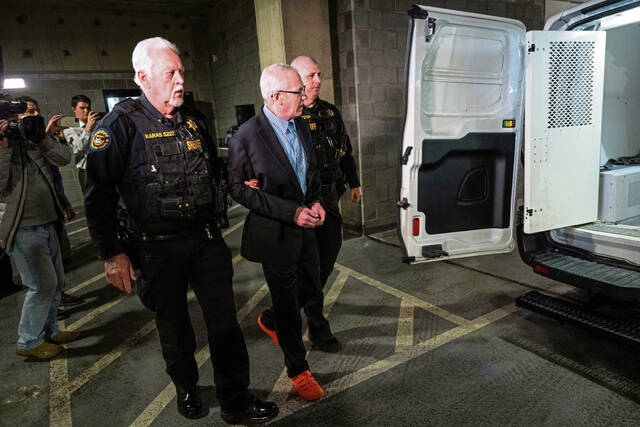Voters ultimately will decide whether embattled Register of Wills Sherry Magretti Hamilton can remain in her post beyond her current four-year term that started in January, political experts say.
Westmoreland County judges this week intervened in the oversight of Hamilton’s courthouse office — which processes adoption and estate records — amid complaints about deficiencies that caused delays in court filings and appeals.
“For good governance to happen, there are two layers that need to happen: Elected officials need to do the job effectively, and also voters need to make a determination if elected officials live up to that expectation,” said Vinny Cannizzaro, executive director of the central chapter of the Pennsylvania Economy League.
Hamilton, a Republican from Hempfield, has served as elected register of wills since 2016. She was reelected without opposition to a third term in November. She will be paid $89,774 this year to run the court-related filing office.
That office has come under fire during the past year as complaints surfaced about long delays in the issuance of adoption certificates and the filing of appeals.
Hamilton on Wednesday appeared before a county judge to answer those concerns. During more than an hour of testimony, she blamed office issues, staff shortages, disloyalty and insubordination among her employees.
She conceded that health and family issues prevented her from being on the job for long stretches in 2023. She claimed she previously worked in person at the courthouse on average about 20 to 30 hours a week, presiding over the office.
Philip Hensley-Robin, executive director of Common Cause of Pennsylvania, a nonpartisan nonprofit advocacy group for good government, said elected officials such as Hamilton have no direct requirement to show up to work. But they do have a responsibility to ensure the mandated duties of their office are performed.
“Failure to do that is a fraud on the citizens and taxpayers. Absent a criminal violation, the democratic process is the solution here,” Hensley-Robin said. “It undermines the confidence in government when elected officials don’t live up to their responsibility.”
Judges this week ordered Hamilton’s office to meet specific filing deadlines. Failure to do so could result in contempt of court findings, which carry a potential fine of up to $5,000 and jail time, according to the judge’s order.
Hamilton is scheduled to appear before another judge next month for a hearing to determine whether she is in contempt of court for violating a previous order that set filing deadlines in late 2022.
Muhlenberg College political science professor Chris Borick said voters determine whether an elected official is performing up to standards. For some lower-profile offices such as the register of wills, those standards are sometimes hard to understand, he said.
“Unlike civil servants who have requirements for service, elected officials are in a more nebulous situation. Ultimately, they are beholden to the public,” Borick said.
Borick said short of a criminal conviction that results in impeachment by the state Senate, there is little that can be done to remove an elected row officer from their post.
Pennsylvania’s governing code for most counties, including Westmoreland, dictates that record-keeping offices — the register of wills, the clerk of courts for criminal records, the prothonotary for civil and family court and the recorder of deeds — are overseen by elected officials.
In some counties in Pennsylvania, including Allegheny County, those jobs are appointed positions because of changes to the government’s structure. Allegheny County voters approved a Home Rule charter in 1998 that changed their form of government from a board of commissioners to one that is run by elected council members and a chief executive. That structural change also eliminated elected record keepers in favor of administrative appointments.
A change to a Home Rule system of government in Westmoreland County was proposed about two decades ago but was never put before voters.
“Home rule allows each county to make positions in those kinds of (court-related) offices what you want them to be,” Cannizzaro said. “It allows for more localized controls, but it’s not something you can do overnight.”








